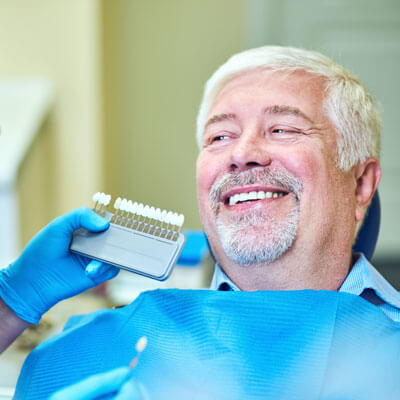 If you’ve ever looked at a picture of a celebrity and wondered how they maintain their pearly white teeth, we’ve got the answer for you – Teeth Whitening! As with any cosmetic treatment, there is often one question people ask – is teeth whitening safe for all ages? Let’s take a look at what it entails and how safe the process is.
If you’ve ever looked at a picture of a celebrity and wondered how they maintain their pearly white teeth, we’ve got the answer for you – Teeth Whitening! As with any cosmetic treatment, there is often one question people ask – is teeth whitening safe for all ages? Let’s take a look at what it entails and how safe the process is.
An Introduction to Teeth Whitening Penrith
Despite the best of treatments, it is only natural for teeth to discolour over time. With age, you might notice that your teeth have taken on a yellowish appearance. This is due to the enamel wearing away (becoming translucent) and exposing the yellowish-brown coloured Dentin beneath it. It can also be due to discolouration from strong food chemicals (eg. spices, etc ) The sources are many – drinking coffee, smoking or chewing tobacco, indulging in soft drinks and strong mouthwashes.
This is where Teeth Whitening may be an appropriate treatment to consider. While there are many methods to get this done, all of them use the same basic process. It involves applying an ‘active ingredient’ (usually Hydrogen Peroxide or Carbamide Peroxide) onto your teeth which allows oxidation of the enamel. The entire process might take anywhere from one month to 6 weeks. After the treatment, you should notice that your teeth will change anywhere from three to eight shades lighter! It is a common misconception that Teeth Whitening can turn your teeth white, rather, it lightens your teeth by a few shades.
Types of Teeth Whitening Treatments
You can get the procedure done at a dentist’s office or buy over-the-counter dental strips. We’ve put together the pros and cons of each method so you can decide what’s best for you.
Home Bleach Treatment
This is the most common and long-lasting treatment and can be done only by a certified dentist. The first visit essentially involves your dentist taking an impression of your mouth and fabricating a mouthguard (or Bleachguard, as it is referred to) that accurately fits your mouth. The bleach ingredient or bleach gel is then placed in the bleachguard before bedtime and left over night. You will have to continue the treatment at home for up to 6 weeks or as long as the dentist advises.
- Long-lasting with minimal maintenance
- Pain-free and non-invasive
- Requires several weeks
Power Whitening
This is the most common and long-lasting treatment and can be done only by a certified dentist. The first visit essentially involves your dentist taking an impression of your mouth and fabricating a mouthguard (or Bleachguard, as it is referred to) that accurately fits your mouth. The bleach ingredient or bleach gel is then placed in the bleachguard before bedtime and left over night. You will have to continue the treatment at home for up to 6 weeks or as long as the dentist advises.
- Long-lasting with minimal maintenance
- Pain-free and non-invasive
- Requires several weeks
Dental Strips
These are over-the-counter polyethylene strips that have peroxide or other whitening agents adhered on top. All you need to do is remove the liner and press them on top of your teeth. Dental strips have weaker agents and hence are only suitable for those who have mild discolouration. However, it is always advised to visit a teeth whitening dentist who knows what to do.
- Cheap and easy to use
- Strips come in pre-determined sizes which may not fit your teeth
- Use weak agents so visible results will need time
- Unpredictable results
Will The Results of Teeth Whitening Remain?
With good care and maintenance, you can retain the lighter shade for two to three years. Ideally, you should be flossing once and brushing twice daily. Invest in a teeth whitening toothpaste and cut down on tobacco. Like any dental procedure, maintenance is important. Depending on diet, top ups will be required to maintain the tooth colour. Teeth whitening is generally considered cosmetic dentistry and as such, may not be covered in your insurance plan.
So, Is Teeth Whitening Dangerous?
In short, no. As long as you visit a professional, teeth whitening is a relatively safe and harmless way to get a better smile. However, teeth whitening uses corrosive chemicals so there is always a chance that your gums might be react to it. If you are using home treatments, the strip may be too large and touch your gums or there may be too much gel placed in the tray which can be expressed outside the tray onto the gums. It is advisable to always visit a teeth whitening dentist who knows what they are doing.
There are also additional things to consider. The treatment will not change the colour of crowns, veneers or any dental restorative material as it only works on tooth enamel. Therefore, it may be necessary to change the restorative material after the whitening treatment if there is a noticeable change in colour. Sometimes, children might want to opt for the procedure. Teeth whitening is a relatively safe procedure for children to undergo as long as a couple of years have passed since the eruption of their permanent teeth. Even then, it is best to wait for complete teeth calcification before undergoing this and have a dental professional assess the suitability of the procedure. You can also consider alternatives to teeth whitening like getting veneers.
Book your Teeth Whitening consultation today!
Give us a call 02 4732 1244 or inquire through our website at Smith Street Dental and ask your penrith dentist today if teeth whitening is right for you.
